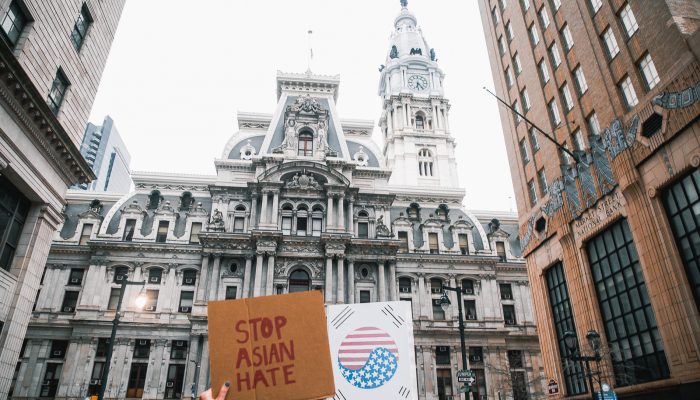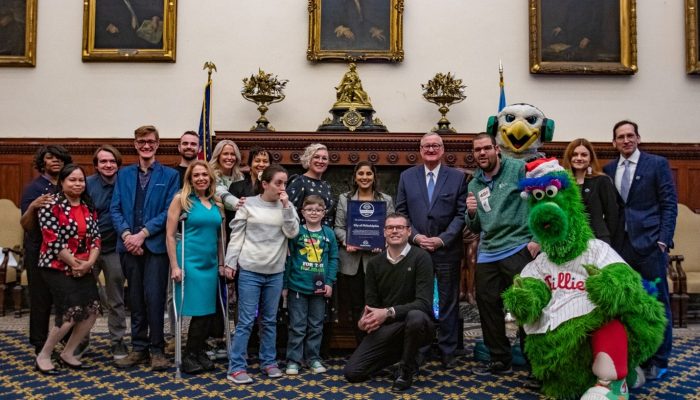Atlanta’s tragic shootings on March 16, 2021 broke the hearts and minds of the Asian and Asian American community across the United States. After generations of marginalization and invisibility, and especially after a full year of being targets of racist taunting, rhetoric, hate, and violence, the community’s tolerance came to a halt. Graphic images of grandmothers and grandfathers being assaulted and murdered on the streets, Asian American mothers with their young children being harassed and physically attacked on public transportation, and a church-going Filipina American woman in New York City being violently assaulted while a nearby doorman turned his back and walked away—these are the stories that dominate the newsfeeds of many within the Asian American and Pacific Islander (AAPI) community.
Right here in Philadelphia on Easter Sunday, local news stations reported that a 27-year old Korean woman was viciously hit in the face and needed to be hospitalized. According to Stop AAPI Hate, 64 incidents of hate and violence targeting AAPI communities have been reported in the last 12 months. The Philadelphia Commission on Human Relations recorded 28 incidents in 2020, a 350 percent increase in incidents since 2019. Over one-third of all hate incidents reported in Philadelphia in 2020 impacted AAPI communities. As AAPI people comprise nearly 8 percent of Philadelphia’s population, this statistic should be alarming to everyone.
Here are ways that you can take a stand and stop Asian hate in your community today.
Speak up – Silence is Devastating
Take action and let your co-workers and the AAPI community know that you see and care about what is happening. Do this formally and informally. This could include having a conversation with a friend, co-worker, or neighbor to simply ask them how they are doing. Lead with kindness and be open to listening. If you are in a position to make a more formal, appropriate statement on behalf of your department or office, you should consider doing so. Review this statement as a guide.
Dispel the Model Minority myth
The model minority myth was created as a way to uphold the perceived success and prosperity of Asians. It’s been used as a wedge to divide and pit Asians against other communities of color, which only reinforces the status quo of the existing racial structure. Be aware of these harmful narratives that influence our lives. Observe your biases and ask questions of yourself and others. Do you assume that Asians fit a specific stereotype? When you see an Asian or Asian American walking towards you, what thoughts come to your mind? Take the time to hold yourself accountable.
Learn about the history of Asians in America
Anti-Asian hate and violence in the United States is as old as the first ancestor who crossed the sea to step foot on the golden shores of California over 170 years ago. Throughout the decades and generations, we can track levels of discrimination and harassment with federally instituted laws and policies that kept Asians from becoming citizens, prevented the ownership of property, unjustly incarcerated an entire ethnic group of people based on race and more. Watch this PBS documentary to learn more.
Listen and learn from AAPI influencers and community leaders who are speaking up
Diversify who you follow on social media and listen to those who are speaking up and sharing their experiences—both locally in Philadelphia and across the country. The #MeToo movement’s central phrase (“believe women”) applies to this issue as well. In this case, believe AAPIs when they tell you their race was a factor in their negative experiences. Do not gaslight, minimize, or deflect the experiences of an AAPI individual or community.
Include AAPIs in your racial equity work
Many organizations, corporations, and governments—including the City of Philadelphia—are now looking at their work through a racial equity lens. For example, the City operates under a Racial Equity Executive Order established by Mayor Kenney in January 2020. Keep in mind the diverse characteristics and experiences of and within the AAPI community in your racial equity work, and go beyond a black and white racial framework.
Grow, nurture, and empower your AAPI workforce
According to the 2020 City Diversity workforce report, Asians make up less than four percent of the City’s workforce. Hiring managers and supervisors should be mindful of these statistics when recruiting, developing, and elevating talent. Greater numbers of Asian employees—and increased diversity overall—will lead to greater impact in achieving equitable outcomes.
As a way to create a space for AAPI City employees and allies to heal and build community, the City of Philadelphia will support the development of its first-ever AAPI City Resource Group this spring.
Be an upstander, not a bystander
Many of the recent attacks against Asians and Asian Americans happened in broad daylight without intervention by those who watched. Hollaback and Asian Americans Advancing Justice have partnered to create a special training to teach you what to do when you see a bias incident or act of hate happening. Don’t shut the door, don’t look away. Stand up, speak out, and let’s keep each other safe.
Romana Lee-Akiyama is the City of Philadelphia’s Deputy Director of the Office of Immigrant Affairs. As a daughter of a Chinese political refugee, Romana uses her lived and family experience to inform her work and perspective on life. In response to alarming levels of hate and violence in 2021 impacting the Asian American and Pacific Islander communities, Romana became the executive sponsor for the City of Philadelphia’s first-ever AAPI City Resource Group.




